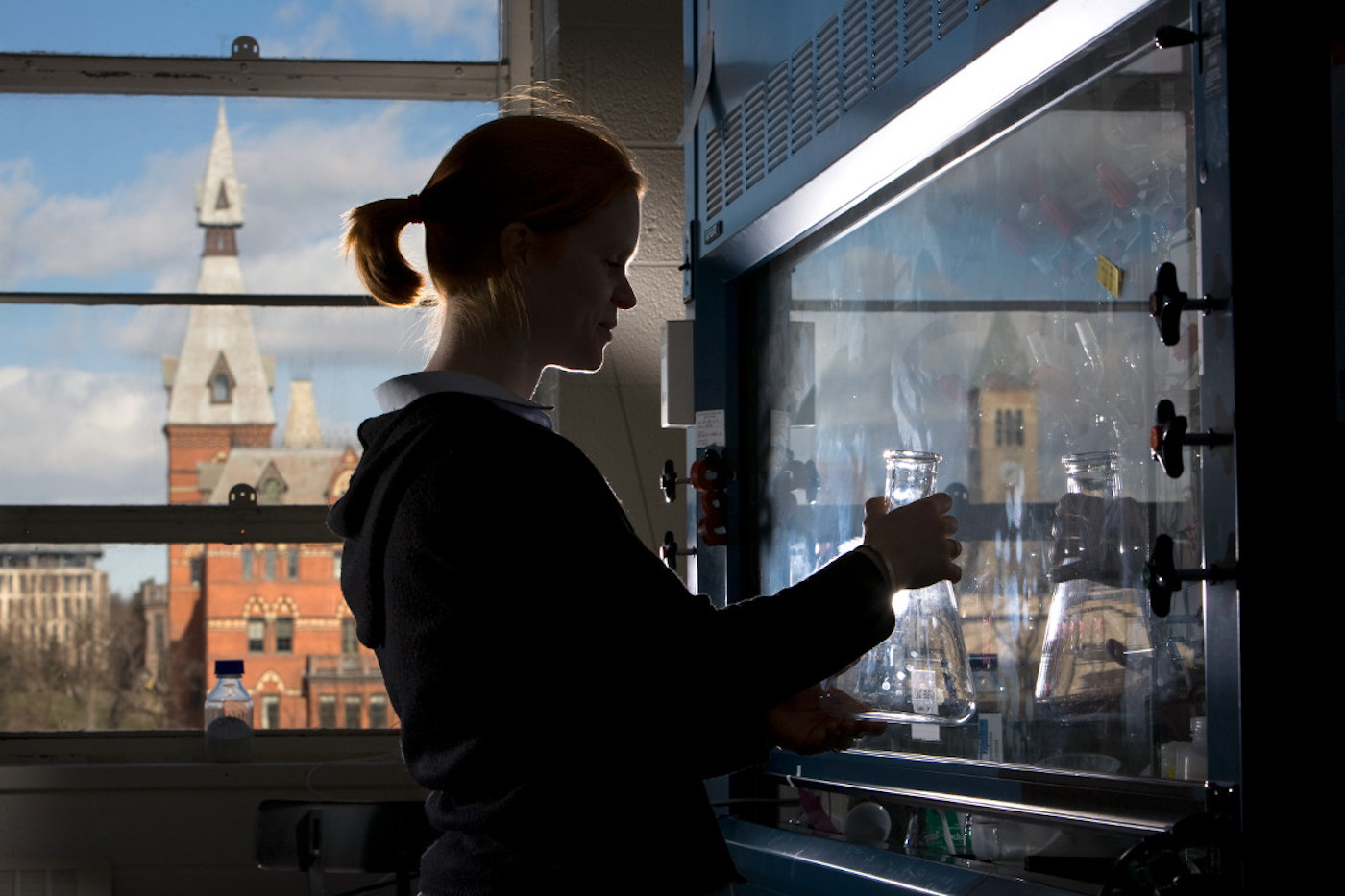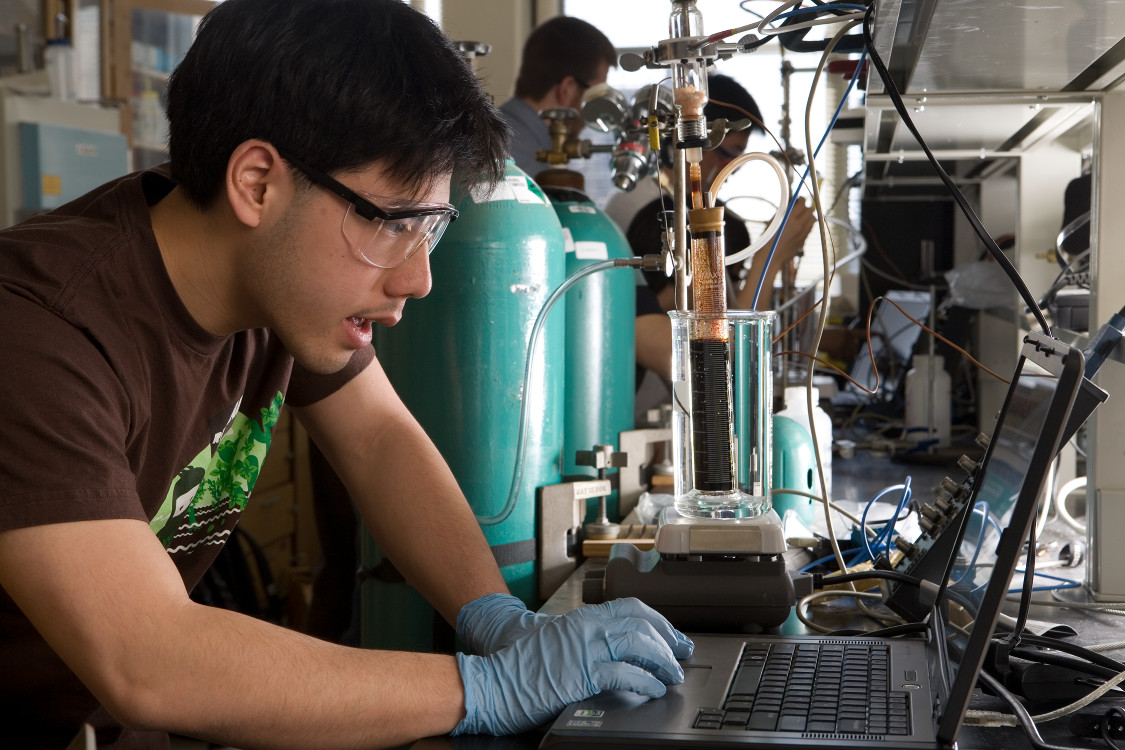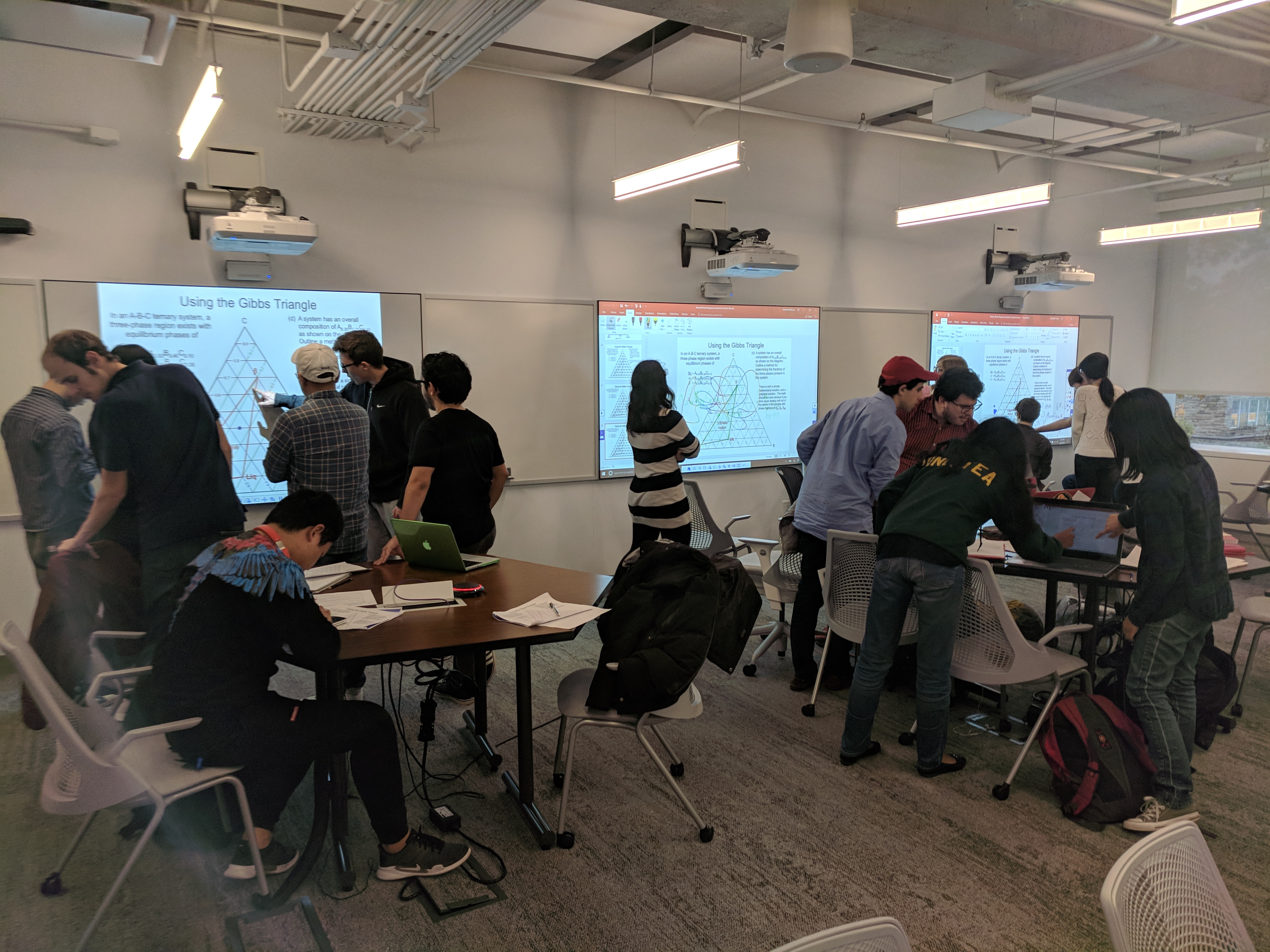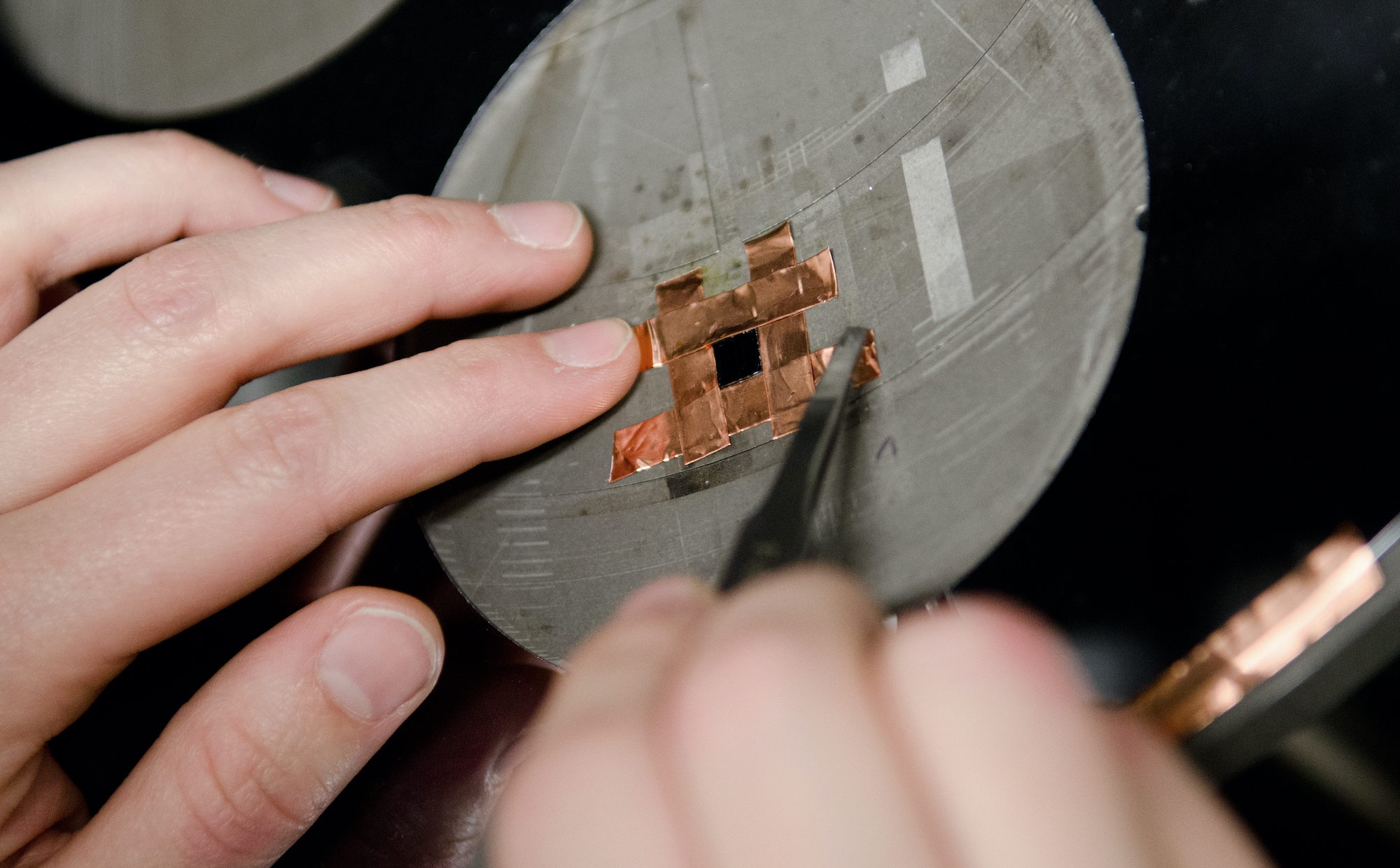
MSE is a small, close-knit major that has provided me with support in my academic and personal life. The academic freedom has allowed me to explore different avenues outside of engineering that include ethics, wines, and astronomy.

The Stone Age, the Bronze Age…the Silicon Age. We name eras by the materials that define them. And those materials define so much of what’s possible in our lives: drive a car; land on Mars; talk and text across thousands of miles; store, transmit, and manipulate data; produce, store, and distribute energy. Materials scientists and engineers are at the very center of imagining and delivering progress. Cornell has long been a leader in the field, and our Materials Science and Engineering (MSE) graduates are in demand in every sector and industry.
The field of Materials Science and Engineering is broad and multidisciplinary, building on fundamentals of physics, chemistry, and biology. We manipulate mechanical, electrical, optical, magnetic, and chemical properties to create and improve the materials from which all engineered objects are made.
 Our field is changing rapidly. While we remain heavily engaged in core Materials Science disciplines including polymers, ceramics, and semiconductors, at Cornell we are also leading the way in a dramatic transformation of the field. Increasingly, we employ an integrated approach in exploring and engineering materials, using our unique perspectives and expertise to help solve some of the world’s most pressing problems. We intend to have a powerful impact on the sustainability of our planet and the health of our economy.
Our field is changing rapidly. While we remain heavily engaged in core Materials Science disciplines including polymers, ceramics, and semiconductors, at Cornell we are also leading the way in a dramatic transformation of the field. Increasingly, we employ an integrated approach in exploring and engineering materials, using our unique perspectives and expertise to help solve some of the world’s most pressing problems. We intend to have a powerful impact on the sustainability of our planet and the health of our economy.
To achieve these goals, we have established major research initiatives in Energy Production and Storage, Electronics and Photonics, Bio-inspired Materials and Systems, and Green Technologies. We are well positioned to remain at the forefront of these and other emerging areas because of the strength of our department, the vast intellectual and facilities resources across Cornell, and our well established mindset of continually pushing the boundaries.
To learn more, we invite you to explore our approach to these key questions:

MSE is a small, close-knit major that has provided me with support in my academic and personal life. The academic freedom has allowed me to explore different avenues outside of engineering that include ethics, wines, and astronomy.
All engineered products – from airplanes to musical instruments, alternative energy sources to ecologically-friendly manufacturing processes, medical devices to artificial tissues, computer chips to data storage media, and many more – are made from materials. Today’s materials scientists and engineers change and improve these. In fact, new and altered materials are often at the heart of product innovation in highly diverse applications. Materials scientists work in all industries as well as in academia and research institutions on a wide range of life-improving endeavors.

In our work, we strive to understand and manipulate the molecular structure of materials, since the arrangement of atoms and molecules is what creates their mechanical, electrical, optical, magnetic, and chemical properties. One of the newest technologies available to us is nanotechnology, which enables us to tailor the structure of materials at billionth-of-a-meter scale.
At Cornell, materials scientists and engineers have excellent access to some unique and extraordinary tools and facilities, which means that researchers and students here can undertake work that can be done at very few other places in the world. Among these are Cornell NanoScale Science & Technology Facility (CNF), which provides unique, state-of-the-art facilities for nanofabrication, and Cornell High Energy Synchrotron Source (CHESS), with its multifaceted research and development facilities.
See what inspired students to study materials science and engineering at Cornell, what they hope to achieve, and what advice they have for incoming students.

Kelly chose MSE because she was "excited by how versatile materials science is in a variety of industries and the flexibility that offered for my future career path." Read more about MSE Senior Spotlight: Meet Kelly Liu

Bill joined MSE because he wants to predict and simulate novel materials for cheaper, faster, and more sustainable functional materials in the future. Read more about MSE Senior Spotlight: Meet Bill Liu
Materials Science and Engineering is an inherently interdisciplinary field. We study the relationships among structure, properties, synthesis, and performance of materials. Specifically,

You’ll find specific course requirements for our undergraduate curriculum, and requirements for the M.Eng., M.S., and Ph.D. degree programs in the appropriate program descriptions. Whether you choose MSE as an undergraduate major or whether you enter one of our graduate degree programs with a background in MSE or some other field, you will share some common experiences.
Materials Science and Engineering requires a deep knowledge of fundamentals. It incorporates mathematics, physics, chemistry, and increasingly biology, as well as skill sets from all the engineering disciplines – all of which are needed to understand how materials work and how they can be improved. Beyond these basics, you’ll master knowledge in these areas:

Who majors in MSE? We welcome students of varied educational backgrounds from across the U.S. and around the world into our department. Some undergraduates arrive having already chosen this major, while others explore a variety of interests – largely through the College of Engineering, but sometimes other areas – before declaring MSE as their major.
In our graduate programs, we've had highly successful students come from undergraduate programs in MSE, and also with degrees in one of the sciences, mathematics, another engineering field, and occasionally another discipline altogether. Since our field is interdisciplinary, students find their special niches and interests, and we ensure that they surround their special interests with the appropriate depth and breadth of knowledge.
Where do they go? Cornell MSE graduates with bachelor's degrees land positions with competitive, first-year engineering salaries and attend highly ranked graduate schools. Those who complete master's and doctoral degrees go on to excellent positions in academia, research, and industry – and their earnings, too, on average exceed those of individuals with MS&E degrees from many other institutions. The College of Engineering Career Center staff survey each class and track respondents' destinations and salaries. Since every technology depends on materials, MSE graduates are in demand in every technology sector. The broad, interdisciplinary approach of MSE is also ideal preparation for technology-oriented careers in business, law, or medicine, as well as in academia and research.
Here are just a few of the prestigious positions held by Cornell MSE alumni:

Core classes cover a broad range of materials and applications…giving the students the freedom to pursue their interests. I came to Cornell with the goal of combining materials science and engineering with fiber science to improve first responder uniforms.
If you want to expand your understanding of the field of materials science and engineering, here are some resources we recommend:
Books of particular interest include these very readable volumes:
The Substance of Civilization, by Stephen L. Sass, Arcade Publishing (1999). Prof. Sass is an Emeritus member of the Cornell MSE Department. This book discusses the symbiotic relationship between culture and the evolution of technology as determined by materials science. Sass bridges the divide between history and science as he explains the unique properties of such key substances as clay, iron, glass, polymers, and silicon, as well as how they have affected every aspect of civilization, from warfare to religion, politics, education, art, and economics.
The New Science of Strong Materials, or Why You Don't Fall Through the Floor, by J.E. Gordon, Princeton University Press (2006). J.E. Gordon, a professor at the University of Reading, provides this biographical narrative of the discovery of why some materials are strong, and some are not. This book is highly regarded as being both entertaining and educational.
Why Things Break: Understanding the World by the Way It Comes Apart, by Mark Eberhart, Three Rivers Press (2004). Eberhart, a professor at the Colorado School of Mines, explains why things break and what materials scientists are doing to make materials stronger and tougher. Why can you bend a piece of taffy into all kinds of shapes, while a peppermint stick breaks if you push on the middle of it? Why does adding carbon to iron make the resulting metal - steel - stronger, whereas adding sulfur brittles it, making it more liable to break?
Stuff: The Materials the World Is Made Of, by Ivan Amato, Harper Perennial (1998). Amato is a science writer. This easy-to-read book provides a history of the effect of new materials on society.
We always welcome your questions. Here are contacts for our undergraduate program in MSE.
Prof. Michael Thompson
Dwight C. Baum Professor in Engineering
Director of Undergraduate Studies
328 Bard Hall
607-255-4714
email
Prof. Christopher "Kit" Umbach
Assistant Director of Undergraduate Studies
114 Thurston Hall
607-216-8872
email
Michele Conrad
Undergraduate Student Services Coordinator
210A Bard Hall
607-255-9159
email